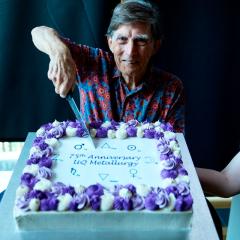During a major crisis like a global pandemic, access to reliable information is critically important, as it can give us ways to effectively respond, act and avoid panic.
But when looking for information and advice online, it can be hard to know what’s real and what’s fake – a problem researchers say can be influenced by our own biases and stereotypes.
By developing artificial intelligence systems and collecting a range of online data over several years, UQ researchers have shown how bias and stereotypes affect the way we trust information.
Data scientist Associate Professor Dr Gianluca Demartini says the research shows that our background can determine how vulnerable we are to fake news.
“We’ve observed a strong impact of people’s background on what they believe is true,” Dr Demartini says.
“In the political domain, participants who have a certain political idea are more likely to believe fake news (as assessed by experts) if it’s aligned with their political thinking.
“That is, if a US participant voted Republican at the last election, then they’re more likely to believe Republican fake news than the average reader. The same is true for the Democratic party.”



